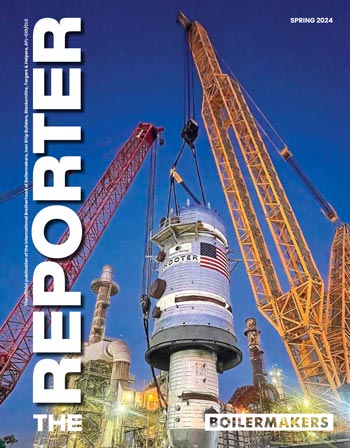
Contact your senators!
Demand a cap-and-trade bill
with job protections.
ONE WAY OR another, the federal government will soon begin acting on the issue of global warming. Either an energy bill with a cap-and-trade program to lower greenhouse gases will pass Congress and be signed by President Obama, or the Environmental Protection Agency (EPA) will begin using its regulatory authority to lower emissions.
A recent U.S. Supreme Court decision gave EPA the authority to regulate carbon dioxide (CO2) emissions under the Clean Air Act if Congress fails to pass legislation, and the agency has opened the door to their involvement by issuing a finding that greenhouse gases endanger the public health and welfare by contributing to climate change.

“Doing nothing is not an option. With the right provisions, the energy bill can significantly reduce greenhouse emissions without wrecking the economy, and create thousands of Boilermaker jobs building new pollution control technology.”
— Abe Breehey, Boilermaker Director of Legislative Affairs
Boilermaker Director of Legislative Affairs Abe Breehey says we can’t afford to leave such a complex and far-reaching problem to the EPA. The Clean Air Act was written over 30 years ago to address local and regional pollution problems. Using it to address global warming could cause significant economic harm and would be unlikely to accomplish much environmental good.
“We absolutely need an energy bill that contains a workable cap-and-trade program,” he explains. “That is the fastest, most cost-efficient way to lower CO2 emissions. But our domestic efforts must be coupled with a global strategy. If we insist that U.S. businesses lower their emissions, then we must also insist that our global partners and competitors make a comparable effort.”
Breehey favors an “international reserve allowance” that would adjust the price of energy-intensive imports to account for carbon content, in effect imposing a “carbon tariff” on imports from countries that don’t lower their emissions. The House energy bill contains such a provision.
Nobel Prize-winning economist Paul Krugman agrees. In his daily blog, he explained that “there’s perfectly sound economics behind border adjustments related to cap-and-trade... If you only impose restrictions on greenhouse gas emissions from domestic sources, you give consumers no incentive to avoid purchasing products that cause emissions in other countries.”
He went on to say that carbon tariffs would probably be allowed under current trade law, because they would level the playing field, but not give any one country an unfair advantage.
Support for this approach also came from 10 senators who wrote a letter to President Obama August 6 supporting measures to ensure a strong U.S. manufacturing sector. They named four possibilities: providing short-term assistance to trade-exposed industries; making trade agreements address manufacturing competitiveness; holding countries accountable for emissions reduction; and investing in energy efficiency and clean technology.
“Doing nothing is not an option,” Breehey says. “With the right provisions, the energy bill can significantly reduce greenhouse emissions without wrecking the economy, and create thousands of Boilermaker jobs building new pollution control technology. But no one in Congress will understand our position unless we explain it to them.”
Call your senators today to demand action on cap-and-trade legislation with job protections for American workers. Contact information for senators and representatives can easily be found at the LEAP into ACTION website.






